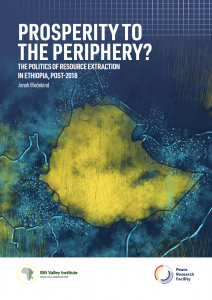THE POLITICS OF RESOURCE EXTRACTION IN ETHIOPIA, POST-2018
SUMMARY
• With the formation of the Prosperity Party (PP) in 2019, Abiy Ahmed’s government set out to redress the relationship between the central government and ‘peripheral’ regional states. This included reforms to the governance of resource extraction and revenue distribution, thereby giving resource-rich but politically marginalized regions a fair share of ‘prosperity’.
• Departing from the Ethiopian Peoples’ Revolutionary Democratic Front (EPRDF)’s state-led, developmental economic policies, the PP government purportedly embraced market liberalization, vowing to privatize state-owned enterprises (SOEs) (e.g. sugar estates); enhance investments in the extractive sector (e.g. gold, gas/oil); and improve the productivity performance of underperforming sectors (e.g. salt, sugar).
• Redistributive reforms—including transferring (salt/gold) mining concessions to youths or a broader cross-section of society, and pledging a greater share of resource revenues to host regions—were often politically motivated, the aim being to co-opt and pacify certain sections of society, and create/capture regional business elites loyal to the government.
• The PP-fostered business elites—initially from Oromia and Amhara regions—moved to occupy strategic economic sectors (e.g. gold, sugar and salt) previously controlled by Tigray People’s Liberation Front (TPLF) affiliates or dominant regional endowment funds and SOEs. Whenever the political centre’s regional/ethnic alliances shifted, this reopened struggles over the control of extractive resources in the peripheries.
• Economic defects continue to plague strategic extractive sectors under the PP. Issues include monopolization, hoarding and price manipulation of key resources (e.g. salt, sugar); an absence of community consultation and environmental impact assessments (e.g. gold and sugar); the cancellation of unproductive or speculative projects (e.g. oil/gas, gold); and incomplete privatization due to mismanagement, lack of productivity and mounting costs (e.g sugar). These trends run counter to the PP’s first Homegrown Economic Reform agenda and have had to be deferred to a second, upcoming agenda.
• Conflicts and violence related to resource extraction in peripheral regions remain common, encompassing various forms of local resistance that interact with increasingly ethnicized borderland and territorial conflicts, ethno-national insurgencies and counterinsurgencies, as well as government-led disarmament, demobilization and rehabilitation campaigns.
• The government holds that extractive investment projects can contribute to peacebuilding in conflict areas through development. Often, however, such projects are subject to distributive struggles and conflicts and are prone to failure. This is particularly true if prior consent and community consultation in the establishment and operation of projects is not pursued, or armed counterinsurgents and/or organized youths perceive them as exclusively serving the federal government or regional elites
and their business affiliates.
• Despite the PP pledging to redress Ethiopia’s centre–periphery model of politics, the balance of power vis-à-vis peripheral regions and the political centre has not shifted fundamentally. Top–down policymaking, project enforcement, centralization of political power and economic rents, and privileging some (ethnic) business elites with access to resources/revenues in the peripheries have all persisted under the PP, albeit as part of different alliance formations.
Find the Amharic summary of this report here.



